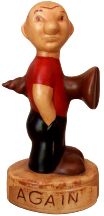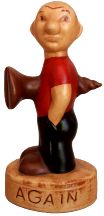 |
 The Virtual Corkscrew Museum's Weekly Newspaper |
 |
 |
 The Virtual Corkscrew Museum's Weekly Newspaper |
 |
|
Sunday, March 30, 2008 |
Number 510 |
The 18th Amendment
The18th amendment to the United States Constitution became law January 17, 1920. It became known as the "National Prohibition Act".
Section 1. After one year from the ratification of this article the manufacture, sale, or transportation of intoxicating liquors within, the importation thereof into, or the exportation thereof from the United States and all territory subject to the jurisdiction thereof for beverage purposes is hereby prohibited.
Section 2. The Congress and the several states shall have concurrent power to enforce this article by appropriate legislation.
Section 3. This article shall be inoperative unless it shall have been ratified as an amendment to the Constitution by the legislatures of the several states, as provided in the Constitution, within seven years from the date of the submission hereof to the states by the Congress.
The 18th Amendment was repealed after 13 years and alcohol began to flow again on April 7, 1933.
As we approach the 75th anniversary of repeal, we take a look back at the corkscrew during the period leading up to Prohibition and the early years.
Corkscrews as Hair Pins
From the January 31, 1919 Oakland Tribune (California): The Kansas City Star suggests that corkscrews be straightened out and used for hair pins. Nonsense ... Better save them for posterity, to be exhibited 100 years hence as relics of an almost unforgotten day when great great grandfather used to operate one.
Corkscrew to Button Hooks
From the February 10, 1919 edition of the Alton, Illinois Evening Telegraph: It is said that after July 1, all corkscrews in the country will be converted into shoe buttoners, and shoe buttoners will have about as little work' to do as corkscrews after awhile, apparently.
Corkscrews to Gimlets
From the February 22, 1991 edition of the Woodland, California Daily Democrat: The cork screw manufacturer has been hit hard by the National Prohibition amendment, unless cork screws can be converted into gimlets.
Corkscrews to Awls
From the July 3, 1919 edition of the Lowell Sun (Massachusetts): Formerly we were enjoined to turn the sword into a ploughshare. Perhaps last fall it was timely to warn the world to make the tank tractors stir the ground to fruitfulness. This week we are asked to turn our cork screws into awls. What will be the next transformation demanded?
Non-Alcohol Corkscrew Uses
From the August 7, 1919 edition of the Maurice Times (Iowa): There will still be a use for corkscrews when the nation goes- dry. Corks are found in other bottled besides those containing whisky, "I dare say you are right," said Mr. Jagsby, gloomily, "but a corn [sic] puller of that kind will not be preceded by merry quips amid sparkling repartee, showing. that Joy is about to be unconfined."
Note: In 1907 the Gilchrist Co. of Newark, New Jersey advertised its Yankee No. 1. with "A household necessity - Should be in every home. Don't let any woman struggle with a corkscrew to open tightly corked catsup, olive, pickle, medicine on any other bottle. The Yankee is screwed against any upright surface: Icebox, Sideboard, Door Frame or Wall. It's always there. No hunting for a corkscrew, always ready to draw the tightest cork from any bottle."
Corkscrew Prizes
From the June 19, 1919 edition of the Des Moines Capital (Iowa): Washington, D. C. - There has been no rush thus far by senators to buy any of the 171 corkscrews discovered the other day in the senate stationery room, which sells everything from nail files to—well, to corkscrews. It has been suggested however, that the corkscrews be given as consolation prizes to the museums of 171 towns failing to get captured German cannon.
The Vanishing Corkscrew
From the December 8, 1920 edition of The Ada Evening News (Oklahoma): A man walked, into a Dallas hardware store Wednesday looking for a corkscrew, and his demand was so unusual that the storekeeper hasn't forgotten it yet. The man purchased a corkscrew all by itself, and not as a part of a pocket knife. There is a reason why he couldn't get a pocket-knife with a corkscrew to it. That reason is the eighteenth amendment
In the good old days when a pocket knife was called upon to trim finger nails, open bottles and pull corks they were an altogether different article. Since then the pocket knife's evolution has been slow but sure. First came the pretty manicurist, and man's love of having his hand held by a pretty girl soon eliminated the nail file and clippers from the pocket knife. Then came the eighteenth amendment, and presto! the corkscrew has vanished.
The process of elimination stopped here, but the process of moderation continued. Tailors reduced pocket space to a minimum and the handles of knives were made smaller to fit. That is why the pearl handled knives being sold In Dallas now have only two blades. The Dallas hardware man frankly admitted the change is very noticeable.
Woman Manages Corkscrew Plant
On September 13, 1922 the Reno Evening Gazette reported "Alton is noted for one industry that has no near rival in the country. It is the home of the corkscrew manufacturing industry. Strange to say, in this prohibition time it is thriving.
And a woman is the guiding spirit.
Mrs. William E. Clough carries on the business that made her husband's name known the world over where bottled, goods of any sort are handled in quantities.
Mr. Clough died two years ago. For fifty years he had worked out and perfected machinery for the making of corkscrews in quantities.
When he died Mrs. Clough did not sell out the business and don widow's weeds and shut herself away from the world, as was the old time idea. She gathered the workmen together and placed the business in their hands and told them to go to it.
A very efficient superintendent of the plant who had been with her husband thirty years loyally stuck by her, as did the rest of the help, and the machines are twirling out corkscrews by the hundreds of gross daily."
During the final years of the Prohibition period, we see a change in the view of the corkscrew.
Prohibition Boosts Corkscrew Market
From the Associated Press February 21, 1931: The corkscrew market has suffered no depression, their makers agreed at the closing conference of the Western Metal congression here today.
Before prohibition, delegates were told, 7 tons of low grade steel were used yearly to manufacture America's corkscrews and bottle cap openers. Today it takes 225 tons of metal to supply the demand of those who open bottles.
Clough Still Going Strong
On September 11, 1931 the Lowell Sun (Massachusetts) reported: Alton, New Hampshire - Don't worry world—the corkscrew business is picking up. Nell Clough declares that hard times In the corkscrew industry are over and Nell ought to know, for her little red factory in Alton village produces about 90 per cent of the world's supply of stopper-pullers.
More than 30.000,000 corkscrews will go out of the Alton village factory this year, Mrs. Clough says.
China has ordered 3000 gross. But China is a particular customer. She must have the bright alloy of tin In her corkscrews. The ordinary bronze base doesn't shine enough to suit the China trade.
South Africa has ordered a like number for medicine bottles. Big orders have come from Canada, England, Scotland and France. There's one world-famous English product that is never sold without an Alton, N. H. corkscrew attached to the package.
One British railway that operates 18 hotels in Scotland and England has ordered 1,000,000 stopper-pullers.
The perfumers have put in large orders for the coming year. And the perfumers demand a rather special type with handles of wood for the cheaper grade perfumes and handles of gold plate for the more expensive brands.
The business of making the corkscrew in Alton was begun in 1875 by Rockwell Clough, late husband of Nell Clough. According to Mrs. Clough the idea of the twisted wire do-funny came to Mr. Clough shortly after he had cut his finger opening a bottle. The idea earned him a fortune and is still virtually a family monopoly.
The factory today has 16 intricate machines, several of which can turn out 1000 corkscrews an hour, and they're running to capacity.
"The world is clamoring for corkscrews once more," Mrs. Clough says, "and Alton village is aiming to oblige."
Looking for Corkscrews
From the August 28, 1928 edition of The Lancaster Daily Eagle (Ohio):
Meanwhile - in Jamaica
While America was "dry", Jamaica was "wet" and booze was readily available.
This advertisement appeared in the Kingston, Jamaica Gleaner on January 14, 1929:
But Billy Sunday was not about to give up the fight.
Crooks, Corkscrews, and Bootleggers
On May 15, 1930 The Charleston Gazette reported that "Crooks, Corkscrews and Bootleggers —They Shall Not Pass" would be the topic of a sermon to be delivered by Billy Sunday at the local high school during the next week.
Next Week - The 75th Anniversary of Repeal
|
©2008 Don Bull, Editor |